Programming Tips
May 2024
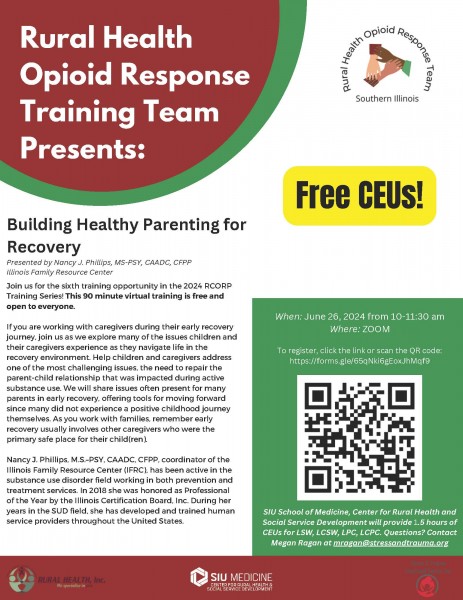
April 2024
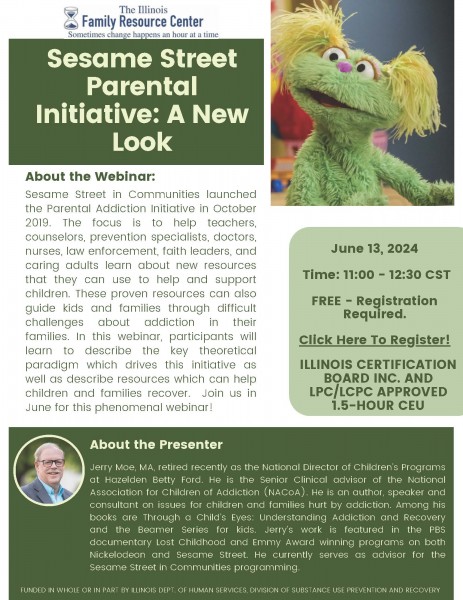
April 2024
Prevent Child Abuse Awareness Resources
Chicago Children’s Advocacy Center is one of the largest children’s advocacy centers in the country and one of only a few at which all partner agencies are co-located. ChicagoCAC hosts free and low-cost education and professional development for social workers, counselors, teachers, youth-serving organizations, and other professionals and community members.
Below you’ll find our upcoming virtual offerings. Please visit our website www.chicagocac.org for more information.
How to Parent After Trauma
4/9/2024, 10 AM – 12 PM
Presented by Alex Horton, Family Support Specialist, ChicagoCAC
When the worst happens, whether an individual or community trauma, parents and caregivers can struggle with how to create a sense of safety for their child. Based on a series of caregiver workshops offered by ChicagoCAC’s clinical staff, this webinar explores the importance of connection, communication, routine and ritual, and attunement when it comes to healing, and what parents and caregivers can do to support their children. CEUs are available for a small fee.
Illinois Sex Crimes and Statutes
4/19/2024, 10 AM – 12 PM
Presented by Annette Milleville, Director of Policy and Strategic Initiatives, ChicagoCAC
How do Illinois laws affect child sexual abuse cases? There are many laws in the State of Illinois which relate to the cases referred to CACs. This session with former Cook County Assistant State’s Attorney, and current ChicagoCAC Director of Policy and Strategic Initiatives, Annette Milleville, will look at current criminal laws including Illinois’ sex assault and sex abuse statutes, the Statute of Limitations for sex crimes and the admissibility of Other Crimes Evidence. This session will explore and explain how these laws and others affect child sex abuse cases, potential charging considerations, and prosecution limitations and opportunities in criminal cases. It is best suited for law enforcement, advocates, and other members of a multi-disciplinary team. CEUs are available for a small fee.
Child Sexual Abuse: Working with & Supporting Boys
4/25/2024, 10 AM– 12 PM
Presented by Researcher and ChicagoCAC Community Advisory Member, Nick Marsh
This workshop explores key concepts in relation to child sexual abuse and working with and supporting boys. This includes exploring definitions of child sexual abuse and the vulnerabilities faced by boys and young men. The workshop will use research and critical reflection to develop an understanding of notions of masculinity and how a young male’s intersecting identities (gender, ethnicity, age, sexuality, disability) can influence the care and support they are provided.
Clinical Issues in Treatment of Child Sexual Abuse
4/30/2024, 1PM – 5 PM CT
Presented by Jan Waters, MS, LCPC, Chief Program Officer, Clinical Services, ChicagoCAC
This training will explore operational and clinical issues critical to the treatment of child sexual abuse that are not commonly covered in trainings on evidence-based practices. Consideration will be given to the needs of children impacted by sexual abuse throughout the treatment process. We will also examine key clinical considerations related to shame, sexual behavior and knowledge, dissociation, caregiver involvement in therapy, and typical symptoms that may occur such as sleep problems, flashbacks, intrusive memories, and transition problems. CEUs are available for a small fee.
April 2024
Resources
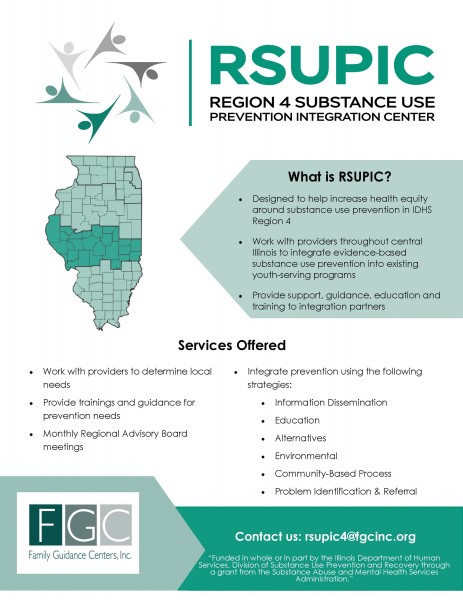
March 2024
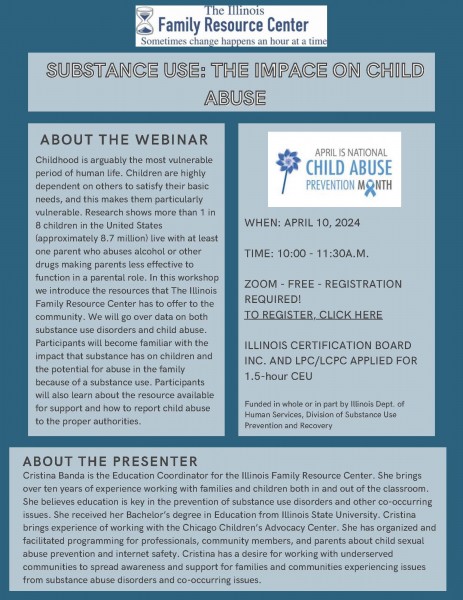 Join us for the discussion regarding substance misuse and the impact on child sexual abuse. To support the Prevent Child Abuse Awareness Month join Cristina Banda, IFRC Education Coordinator, with sharing her experience in this field. To register, please open to the "For Everyone" page and link in the Webinar Schedule. If you have any questions, contact: Zach at: [Please enable JavaScript.].
Join us for the discussion regarding substance misuse and the impact on child sexual abuse. To support the Prevent Child Abuse Awareness Month join Cristina Banda, IFRC Education Coordinator, with sharing her experience in this field. To register, please open to the "For Everyone" page and link in the Webinar Schedule. If you have any questions, contact: Zach at: [Please enable JavaScript.].
March 2024
April is National Child Abuse Prevention Month.
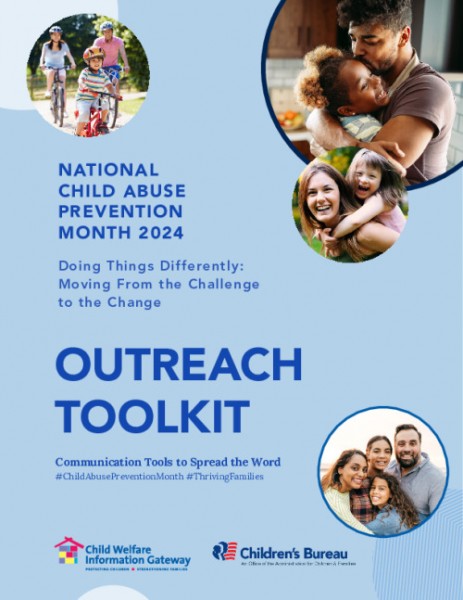 Whether by proclamation, through social media, with graphics, or through other means, spreading the word about child abuse prevention lets your community know they can take action to strengthen families and help them thrive. Use these free prevention outreach tools to engage your community in supporting children, youth, and families this National Child Abuse Prevention Month!
Whether by proclamation, through social media, with graphics, or through other means, spreading the word about child abuse prevention lets your community know they can take action to strengthen families and help them thrive. Use these free prevention outreach tools to engage your community in supporting children, youth, and families this National Child Abuse Prevention Month!
Visit: National Child Abuse Prevention Month Outreach Toolkit | Child Welfare Information Gateway
February 2024
National Drug and Alcohol Facts Week®
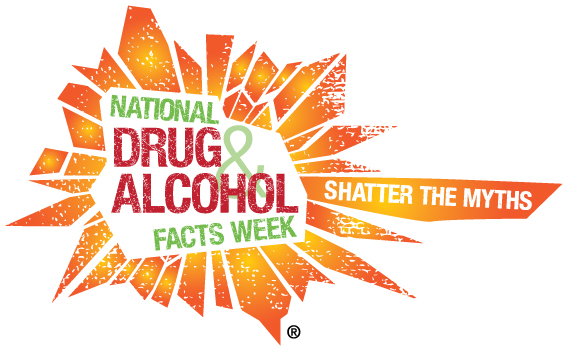 National Drug and Alcohol Facts Week® (NDAFW), an annual health observance, connects youth with resources about drugs, alcohol, and related health topics.
National Drug and Alcohol Facts Week® (NDAFW), an annual health observance, connects youth with resources about drugs, alcohol, and related health topics.
There are countless activities that teens, parents, caregivers, and teachers can do that don’t involve leaving the house.
Check out: Plan Your NDAFW Event | National Institute on Drug Abuse (NIDA) (nih.gov); Get Activity Ideas | National Institute on Drug Abuse (NIDA) (nih.gov)
February 2024
Your Words Matter.
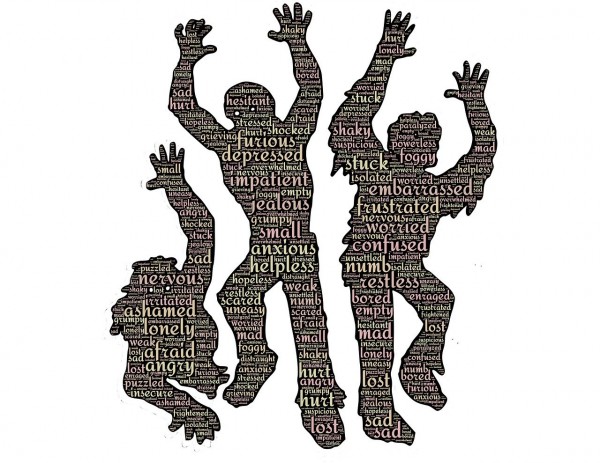 The National Institute on Drug Abuse (NIDA) offers this activity in the efforts to help destigmatize addiction and substance use disorder and reduce negative bias among pregnant women and mothers. The activity has background information and tips for providers on language to use or avoid. This activity is intended for physicians, physician assistants, pharmacists, registered nurses, nurse practitioners/other APRNs, and dentists engaged in the care of patients with substance use disorders. After completing this activity, the participant should be better able to:
The National Institute on Drug Abuse (NIDA) offers this activity in the efforts to help destigmatize addiction and substance use disorder and reduce negative bias among pregnant women and mothers. The activity has background information and tips for providers on language to use or avoid. This activity is intended for physicians, physician assistants, pharmacists, registered nurses, nurse practitioners/other APRNs, and dentists engaged in the care of patients with substance use disorders. After completing this activity, the participant should be better able to:
- Explain the effects of stigmatizing language on patients with addiction.
- Describe the effects of stigma on pregnant women and mothers.
- Compare common terminology and assess which terms should be used or avoided and why.
- Integrate person-first, non-stigmatizing language into everyday practice.
- Identify terms to use and terms to avoid when speaking to patients about addiction.
January 2024

January 2024
Join us for a discussion of parenting and building relationships between parents early in recovery, their children and the care givers that support the journey.
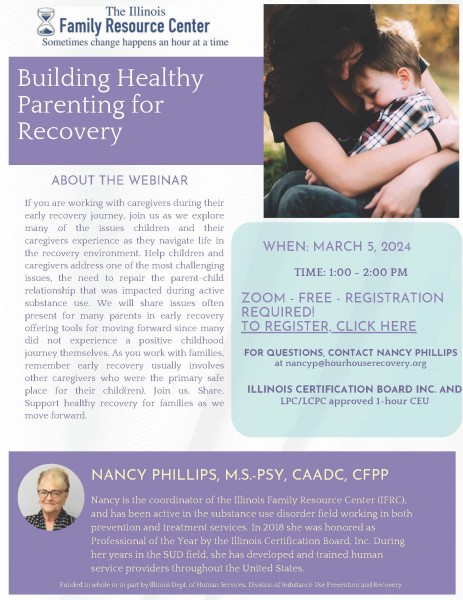
December 2023
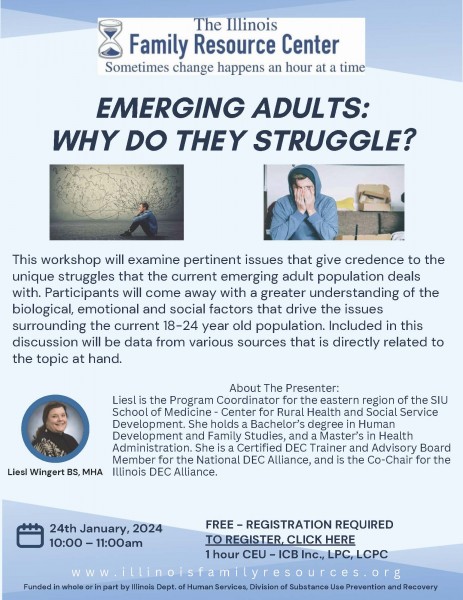
November 2023
Sesame Street
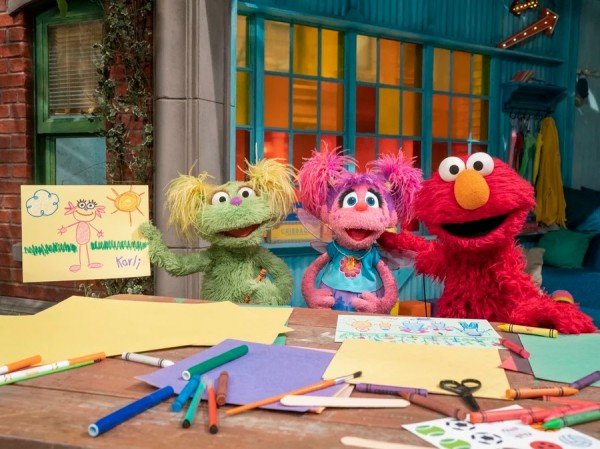 A few years ago, Sesame Workshop, the umbrella organization for the show Sesame Street, began developing some of the first materials specifically created for children aged 1 to 6 whose parents may use drugs or in recovery. Now, a recent grant from the Foundation for Opioid Response Efforts will enable Sesame Workshop to produce more videos, stories and resources focused on addiction, treatment, and healing. Karli is a young Sesame friend who loves pizza and playing monster ball. Right now, her mom is having a tough time dealing with substance abuse. These resources can help the children in your life know that—like Karli—they are not alone. Some of the free materials are available online, and feature famous Muppets like Karli and Elmo, and Chris, one of the shopkeepers on Sesame Street. Visit: How to Talk to Kids about Tough Topics - Sesame Workshop for more information.
A few years ago, Sesame Workshop, the umbrella organization for the show Sesame Street, began developing some of the first materials specifically created for children aged 1 to 6 whose parents may use drugs or in recovery. Now, a recent grant from the Foundation for Opioid Response Efforts will enable Sesame Workshop to produce more videos, stories and resources focused on addiction, treatment, and healing. Karli is a young Sesame friend who loves pizza and playing monster ball. Right now, her mom is having a tough time dealing with substance abuse. These resources can help the children in your life know that—like Karli—they are not alone. Some of the free materials are available online, and feature famous Muppets like Karli and Elmo, and Chris, one of the shopkeepers on Sesame Street. Visit: How to Talk to Kids about Tough Topics - Sesame Workshop for more information.
October 2023
Celebrate Prevention
 This year, we’re celebrating the 10th anniversary of “Talk. They Hear You.®” and looking ahead to SAMHSA’s 20th Prevention Day.
This year, we’re celebrating the 10th anniversary of “Talk. They Hear You.®” and looking ahead to SAMHSA’s 20th Prevention Day.
- Prevention strengthens protective factors and reduces risk factors ― in individuals, families, schools, communities, and across society.
- Prevention science, and decades of community-based experience and scientific research, shows that prevention works.
Visit the Toolkit on SAMHSA's site below.
Check out: Prevention Month | SAMHSA
September 2023
Help Raise Awareness With New Outreach Tools
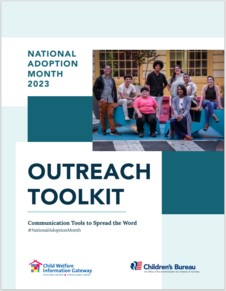 The Child Welfare Information Gateway provides the official Outreach Toolkit that features themed graphics, social media posts, key facts, a virtual meeting background, and more! Add these to your websites, newsletters, emails, meetings, social media pages, and other digital communications to show your support and encourage awareness and action in your networks.
The Child Welfare Information Gateway provides the official Outreach Toolkit that features themed graphics, social media posts, key facts, a virtual meeting background, and more! Add these to your websites, newsletters, emails, meetings, social media pages, and other digital communications to show your support and encourage awareness and action in your networks.
Spread the Word - National Adoption Month - Child Welfare Information Gateway
September 2023
Recovery Month Schedule
SAMHSA's Recovery Month Weekly Themes
 Week 1: September 4–10: This week we highlight supporting youth and young people in recovery and the crucial role that families and caregivers play in supporting individuals who are already in recovery or are seeking to start their recovery journey.
Week 1: September 4–10: This week we highlight supporting youth and young people in recovery and the crucial role that families and caregivers play in supporting individuals who are already in recovery or are seeking to start their recovery journey.
Week 2: September 11–17: This week’s focus is ensuring that people of color, youth, older adults, LGBTQI+, rural residents, veterans, and people with disabilities have equitable access to recovery resources.
Week 3: September 18–24: Our focus this week is promoting a whole-person approach to wellness that addresses the social determinants of health in addition to physical and mental symptoms.
Week 4: September 25–30: This week we highlight the importance of peer support and peer support services in guiding individuals, families, and caregivers through recovery.
Learn more and access Recovery Month resources at samhsa.gov
September 2023
Want to learn more about Al-Anon as a professional?
 Professionals may see adults or teens affected by someone else’s drinking. Al-Anon, a mutual support program for relative and friends of alcoholics, can help. Learn more in a free online workshop provided by District 21, NYC Upper West Side Public Outreach Committee. Online Workshop: Tuesday, September 12th, 4 – 45:45 pm, CT.
Professionals may see adults or teens affected by someone else’s drinking. Al-Anon, a mutual support program for relative and friends of alcoholics, can help. Learn more in a free online workshop provided by District 21, NYC Upper West Side Public Outreach Committee. Online Workshop: Tuesday, September 12th, 4 – 45:45 pm, CT.
To register: https://us02web.zoom.us/meeting/register/tZ0ldOCsqz8oG9TBL_Q-Hk5CrCwa3fvXiiOH#/registration
August 2023
Recovery Month
 As you start your planning for Recovery Month next month, please make sure you’re including International Recovery Day in your initiatives. Join members of the Recovery Community around the nation! Held during Recovery Month on September 30th, International Recovery Day is a chance to send a resounding message to the world: recovery from addiction is absolutely achievable.
As you start your planning for Recovery Month next month, please make sure you’re including International Recovery Day in your initiatives. Join members of the Recovery Community around the nation! Held during Recovery Month on September 30th, International Recovery Day is a chance to send a resounding message to the world: recovery from addiction is absolutely achievable.
Check out: 2023 Toolkit - Recovery Month (facesandvoicesofrecovery.org)
August 2023
Helping Our Transition
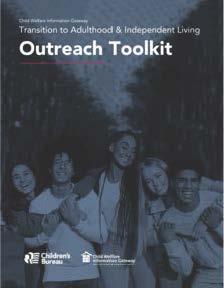 Child Welfare Information Gateway has launched a full update on a resource collection to help caseworkers support youth transitioning to adulthood. Caseworkers and others supporting youth in transition can find resources on programs, emerging practices, and support services as well as other information about extended foster care. Having the right resources in your collection will help youth get engaged and make transitioning out of foster care a smoother process. For the first time, this collection features resources for young adults. This was developed in partnership with lived experience experts. The collection includes Resources for Youth Transitioning to Adulthood, a comprehensive starting point for finding resources on education, employment, finances, housing, life skills, and more.
Child Welfare Information Gateway has launched a full update on a resource collection to help caseworkers support youth transitioning to adulthood. Caseworkers and others supporting youth in transition can find resources on programs, emerging practices, and support services as well as other information about extended foster care. Having the right resources in your collection will help youth get engaged and make transitioning out of foster care a smoother process. For the first time, this collection features resources for young adults. This was developed in partnership with lived experience experts. The collection includes Resources for Youth Transitioning to Adulthood, a comprehensive starting point for finding resources on education, employment, finances, housing, life skills, and more.
Go to: Announcing New Resources for Youth in Foster Care Transitioning to Adulthood (govdelivery.com)
August 2023
 Each September, Recovery Month works to promote and support new evidence-based treatment and recovery practices, the emergence of a strong and proud recovery community, and the dedication of service providers and community members across the nation who make recovery in all its forms possible. Be ready. Check out the resources.
Each September, Recovery Month works to promote and support new evidence-based treatment and recovery practices, the emergence of a strong and proud recovery community, and the dedication of service providers and community members across the nation who make recovery in all its forms possible. Be ready. Check out the resources.
Go to: 2023 Recovery Month Toolkit (facesandvoicesofrecovery.org).
July 2023
National Minority Mental Health Awareness Month
 National Minority Mental Health Awareness Month is observed in July to bring awareness to the unique struggles that underrepresented communities face regarding mental illness in the United States. Join in honoring the importance of minority mental health by sharing related products, resources, and upcoming events.
National Minority Mental Health Awareness Month is observed in July to bring awareness to the unique struggles that underrepresented communities face regarding mental illness in the United States. Join in honoring the importance of minority mental health by sharing related products, resources, and upcoming events.
July 2023
Family and Caregiver Access to Resources on Anxiety and Depression in Children and Youth — Webinar
Wednesday, July 19, 2023 6 – 7 p.m. ET
 The Administration for Children and Families (ACF) and the Substance Abuse and Mental Health Services Administration (SAMHSA) will host a virtual training on Wednesday, July 19, from 6 – 7 p.m. ET for parents, caregivers, and families about children’s mental health. This training will focus on anxiety and depression in children and adolescents. This training is a continuation of the Department of Health and Human Services (HHS) efforts to provide important and useful information and resources about child, youth, and family mental health. This training is co-designed with, and informed by, youth, parents, and caregivers and will feature youth and parent leaders.
The Administration for Children and Families (ACF) and the Substance Abuse and Mental Health Services Administration (SAMHSA) will host a virtual training on Wednesday, July 19, from 6 – 7 p.m. ET for parents, caregivers, and families about children’s mental health. This training will focus on anxiety and depression in children and adolescents. This training is a continuation of the Department of Health and Human Services (HHS) efforts to provide important and useful information and resources about child, youth, and family mental health. This training is co-designed with, and informed by, youth, parents, and caregivers and will feature youth and parent leaders.
This free, virtual training will feature information and resources specifically for parents and caregivers. While it is designed to provide education to parents and caregivers, you do not need to be a parent or caregiver to attend. The training will provide the following:
Information on anxiety and depression in children and youth from parents, caregivers, and behavioral health professionals;
- Useful skills to recognize and respond to children and youth managing anxiety and depression;
- Information on how to access mental health resources and guidance to help children and families;
- An overview of resources available to support parents and caregivers.
Spanish interpretation will be offered live during this training and certificates of attendance will be available.
Webinar Registration - Zoom (zoomgov.com)
June 2023
June is Reunification Month
 June is a time for all who are working with families working toward reuniting to focus and celebrate as recovery builds and families reunite. Families are resilient and strong. For many, substance misuse is at the base of family issues and the need for kinship care and/or legal concerns. This Reunification Month reminds us that we must commit to identifying effective strategies to reunify families. The Children’s Bureau is providing resources for both kinship care, professionals and families regarding family recovery. Use these resources to help engage children and families in the reunification process, equip parents to resolve issues that led to family separation, help increase reunification rates for families from diverse backgrounds, and address racial disproportionality and disparity in child welfare.
June is a time for all who are working with families working toward reuniting to focus and celebrate as recovery builds and families reunite. Families are resilient and strong. For many, substance misuse is at the base of family issues and the need for kinship care and/or legal concerns. This Reunification Month reminds us that we must commit to identifying effective strategies to reunify families. The Children’s Bureau is providing resources for both kinship care, professionals and families regarding family recovery. Use these resources to help engage children and families in the reunification process, equip parents to resolve issues that led to family separation, help increase reunification rates for families from diverse backgrounds, and address racial disproportionality and disparity in child welfare.
Visit: Children’s Bureau (CB) | The Administration for Children and Families (hhs.gov).
May 2023
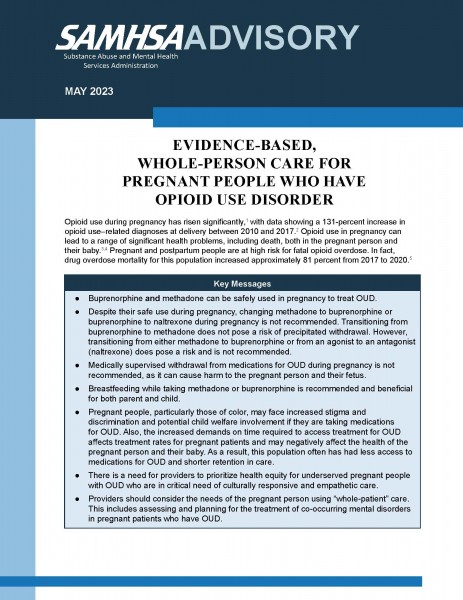 Pregnant people may face significant barriers to receiving treatment for OUD. The opioid epidemic has highlighted the systemic bias and discrimination that pregnant people who have OUD can face in their communities, and even within the healthcare system. Pregnant people who have substance use disorders (SUDs), particularly people of color, have historically had less access to treatment services and can face additional stigma from the healthcare system when they do seek care.For example, some providers may believe that prescribing OUD medications is encouraging patients to “trade one drug for another.” The increased demands on time required to access treatment for OUD, such as long wait times, may also affect treatment rates for pregnant patients, potentially negatively affecting the pregnant person and their baby.
Pregnant people may face significant barriers to receiving treatment for OUD. The opioid epidemic has highlighted the systemic bias and discrimination that pregnant people who have OUD can face in their communities, and even within the healthcare system. Pregnant people who have substance use disorders (SUDs), particularly people of color, have historically had less access to treatment services and can face additional stigma from the healthcare system when they do seek care.For example, some providers may believe that prescribing OUD medications is encouraging patients to “trade one drug for another.” The increased demands on time required to access treatment for OUD, such as long wait times, may also affect treatment rates for pregnant patients, potentially negatively affecting the pregnant person and their baby.
1-877-SAMHSA-7 | ([Please enable JavaScript.]) • [Please enable JavaScript.] (TDD) • WWW.SAMHSA.GOV (May 2023)
May 2023
Resources for Working with Children of Addiction
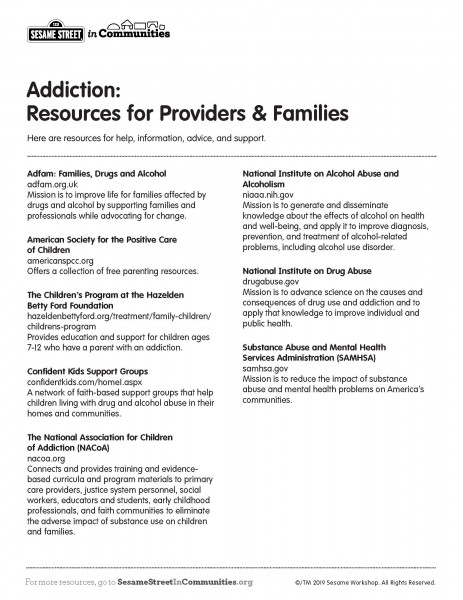 If you work with families with little ones who are impacted by substance misuse, take time to check out the resources offered by Sesame Street in Communities.
If you work with families with little ones who are impacted by substance misuse, take time to check out the resources offered by Sesame Street in Communities.
Parental Addiction | Sesame Street in Communities - Sesame Street in Communities
January 2023
Get to Know NACoA
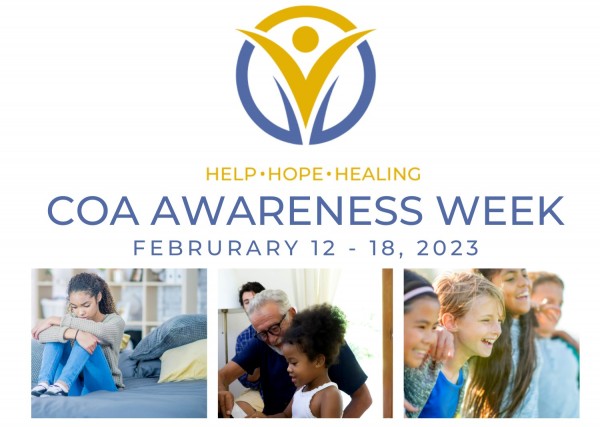 When caring adults are safe and available for children impacted by the disease of addiction, they bring them help, hope, and ultimately healing. COA Awareness Week breaks the silence that engulfs and traps kids and teens living with parental addiction and offers the chance for children at risk to become children of promise. Join us throughout this week to help make a difference that can last a lifetime.
When caring adults are safe and available for children impacted by the disease of addiction, they bring them help, hope, and ultimately healing. COA Awareness Week breaks the silence that engulfs and traps kids and teens living with parental addiction and offers the chance for children at risk to become children of promise. Join us throughout this week to help make a difference that can last a lifetime.
Visit: COA Awareness Week - Nacoa
December 2022
988 Partner Toolkit
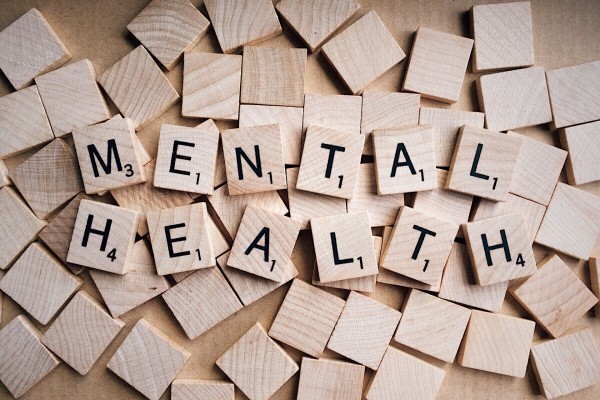 Now is the time to prepare your staff and communities to have a better understanding of the purpose of the new 988 resource number. Have your staff and contacts visit the SAMHSA 988 Partner Toolkit. SAMHSA recognizes the need for governments, states, territories, tribes, crisis centers, and partners to speak with one voice to ensure there is a clear understanding about what 988 is and how it will work. It encourages use of the 988 Partner Toolkit communication outreach materials and building upon them within community coalitions to meet the needs of specific audiences.
Now is the time to prepare your staff and communities to have a better understanding of the purpose of the new 988 resource number. Have your staff and contacts visit the SAMHSA 988 Partner Toolkit. SAMHSA recognizes the need for governments, states, territories, tribes, crisis centers, and partners to speak with one voice to ensure there is a clear understanding about what 988 is and how it will work. It encourages use of the 988 Partner Toolkit communication outreach materials and building upon them within community coalitions to meet the needs of specific audiences.
Check out: 988 Partner Toolkit | SAMHSA
December 2022
Celebrating Families
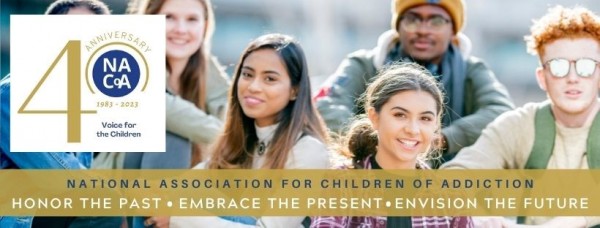 Explore the information of NACoA. They provide programs to address the chaos of our children who live with substance issues in their life. The Illinois Family Resource Center is offering interested community teams an opportunity to participate in the NACoA training for their Celebrating Families curriculum.
Explore the information of NACoA. They provide programs to address the chaos of our children who live with substance issues in their life. The Illinois Family Resource Center is offering interested community teams an opportunity to participate in the NACoA training for their Celebrating Families curriculum.
To learn more, contact [Please enable JavaScript.].
November 2022
Supporting Family Caregivers
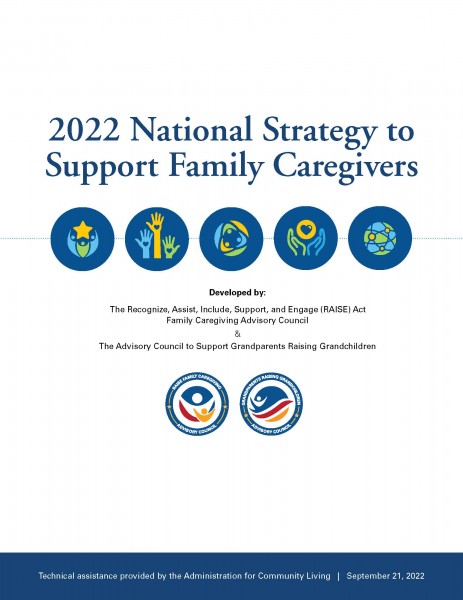 The 2022 National Strategy to Support Family Caregivers was created to support family caregivers of all ages, from youth to grandparents, and regardless of where they live or what caregiving looks like for them and their loved ones.
The 2022 National Strategy to Support Family Caregivers was created to support family caregivers of all ages, from youth to grandparents, and regardless of where they live or what caregiving looks like for them and their loved ones.
The strategy was developed jointly by the advisory councils created by the RAISE Family Caregiving Act and the Supporting Grandparents Raising Grandchildren Act, with extensive input from the public, including family caregivers and the people they support. It will be updated in response to public comments and will evolve with the caregiving landscape. Take a look and comment when appropriate.
You will find the document at: 2022 National Strategy to Support Family Caregivers | ACL Administration for Community Living.
November 2022
Building Resilience & Finding Hope
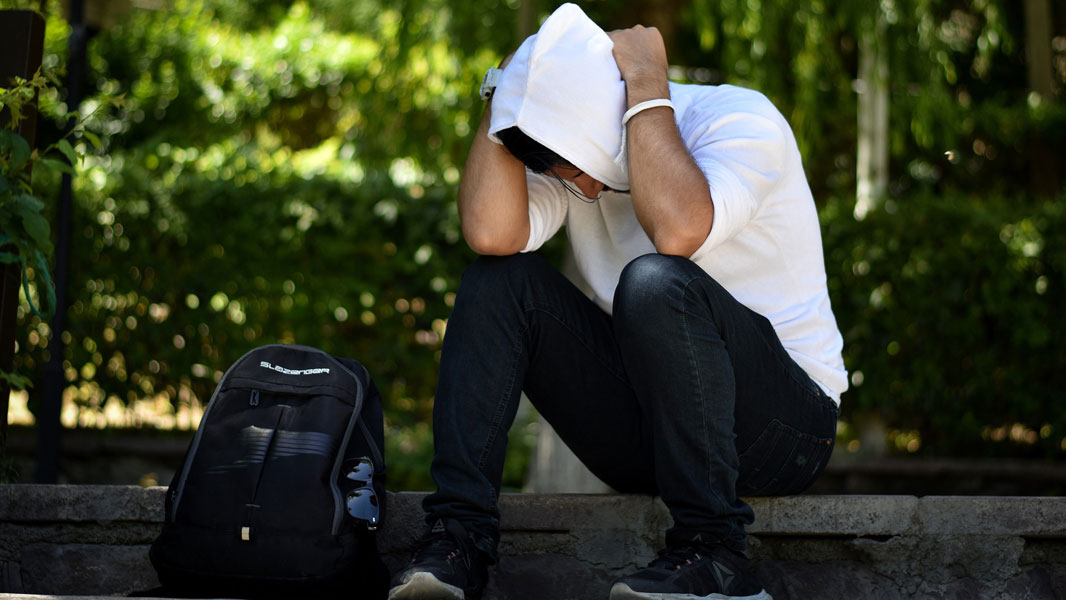 If you work with a population with a risk for suicide, take a look at the following information. According to Hazelden, one of the leading causes of death in the US is suicide and a major concern for everyone in the mental health community. Whether you work with individual clients or provide group therapy, Hazelden Publishing’s new Suicide workbook and DVD are designed to help those who have attempted suicide or experienced ideation.
If you work with a population with a risk for suicide, take a look at the following information. According to Hazelden, one of the leading causes of death in the US is suicide and a major concern for everyone in the mental health community. Whether you work with individual clients or provide group therapy, Hazelden Publishing’s new Suicide workbook and DVD are designed to help those who have attempted suicide or experienced ideation.
The Suicide workbook and DVD focus on:
- Understanding the science behind mental health disorders
- Relating mental health to different areas of life
- Identifying healthy coping strategies
- Challenging unhelpful thinking patterns
- Learning grounding and mindfulness techniques
- Discovering healthy habits to enhance well-being
- Developing assertive communication skills
- Planning for ongoing support
Take a look at the new material: Hazelden Store: Suicide Collection.
October 2022
Take Care of Yourself
 Burnout is a complex issue resulting from chronic workplace stress that involves exhaustion, depersonalization, and reduced personal accomplishment. The Substance Abuse and Mental Health Administration (SAMHSA) offers a new guide to prevent and reduce burnout among behavioral health workers. If you or someone you care about works in the field visit: Help keep our health care workers strong and healthy.
Burnout is a complex issue resulting from chronic workplace stress that involves exhaustion, depersonalization, and reduced personal accomplishment. The Substance Abuse and Mental Health Administration (SAMHSA) offers a new guide to prevent and reduce burnout among behavioral health workers. If you or someone you care about works in the field visit: Help keep our health care workers strong and healthy.
Check out: https://www.store.samhsa.gov/.../SAMH.../pep22-06-02-005.pdf
September 2022
Family-Based Intervention Lowers Long-Term Suicide Risk in Youth
 The National Institute of Mental Health shared findings of a study related to the suicide rate of adolescents and the impact of a family-based intervention called Family Check-Up. Over the last 20 years, suicide rates have increased in the U.S. by 24%, with the largest increases occurring in females ages 10-14 and African American children aged 5-11. These statistics highlight the critical need for better ways to understand and prevent suicide in youth and adolescents. In a recent study supported by the National Institute of Mental Health, researchers examined the impact of a family-based intervention on suicide risk in youth and found risk-reduction benefits up to 10 years later.
The National Institute of Mental Health shared findings of a study related to the suicide rate of adolescents and the impact of a family-based intervention called Family Check-Up. Over the last 20 years, suicide rates have increased in the U.S. by 24%, with the largest increases occurring in females ages 10-14 and African American children aged 5-11. These statistics highlight the critical need for better ways to understand and prevent suicide in youth and adolescents. In a recent study supported by the National Institute of Mental Health, researchers examined the impact of a family-based intervention on suicide risk in youth and found risk-reduction benefits up to 10 years later.
Genetic, neurobiological, cognitive, and social factors contribute to the risk of self-injurious thoughts or behaviors. Research also suggests that family-level factors play an important role in the development of self-injurious thoughts and behaviors during adolescence. Evidence shows that interventions focused on improving family processes, such as improving conflict resolution and encouraging supportive parenting strategies, can reduce long-term suicide risk in youth—even if the intervention does not specifically target suicidal thoughts or behaviors.
To find out more about the study outcomes of the researchers, visit: NIMH » Family-Based Intervention Lowers Long-Term Suicide Risk in Youth (nih.gov).
September 2022
SAMHSA Addresses Burnout
 Burnout is a complex issue resulting from chronic workplace stress that encompasses exhaustion, depersonalization, and reduced personal accomplishment. The Substance Abuse and Mental Health Administration (SAMHSA) offers a new guide that highlights organization-level interventions to prevent and reduce burnout among behavioral health workers. Help keep our health care workers strong and healthy.
Burnout is a complex issue resulting from chronic workplace stress that encompasses exhaustion, depersonalization, and reduced personal accomplishment. The Substance Abuse and Mental Health Administration (SAMHSA) offers a new guide that highlights organization-level interventions to prevent and reduce burnout among behavioral health workers. Help keep our health care workers strong and healthy.
Publication ID: PEP22-06-02-005; Publication Date: September 2022
Publication title: Addressing Burnout in the Behavioral Health Workforce through Organizational Strategies
https://www.store.samhsa.gov/sites/default/files/SAMHSA_Digital_Download/pep22-06-02-005.pdf
August 2022
WHAT’S LEGAL AND WHAT’S NOT?
 Are you still wondering what the rules are related to cannabis use in Illinois? As you work in your organization and community these issues may arise. Be informed. Learn the facts related to responsible choices and information regarding cannabis use.
Are you still wondering what the rules are related to cannabis use in Illinois? As you work in your organization and community these issues may arise. Be informed. Learn the facts related to responsible choices and information regarding cannabis use.
Visit: Let’s Talk Cannabis Illinois | What’s Legal and What’s Not (prevention.org).
July 2022
Parental Addiction: Healing Families Together
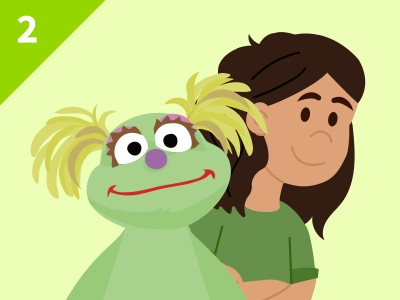 Parental addiction affects the well-being of young children—children you may encounter in your work. You have the opportunity to support children and families affected by addiction, in big and small ways. Join us for a series of webinars to gain resources and strategies you can use right away. Each webinar in this series will highlight a unique provider perspective and offer tactics to address their specific needs.
Parental addiction affects the well-being of young children—children you may encounter in your work. You have the opportunity to support children and families affected by addiction, in big and small ways. Join us for a series of webinars to gain resources and strategies you can use right away. Each webinar in this series will highlight a unique provider perspective and offer tactics to address their specific needs.
In the second webinar of this series, child and family therapist, Jerry Moe, describes the benefits of healing together as a family. He explores resources from the Parental Addiction topic page and offers ways a therapist (or any provider) could use them in their own work with children and families.
To register for this Webinar, you’ll need to create an account to watch this webinar.
Events - Sesame Street in Communities - Sesame Street in Communities
March 2022
HIV/AIDS Curriculum
 National Youth HIV/AIDS Awareness Day (NYHAAD) is observed annually on April 10. NYHAAD increases awareness, generates conversations, and spotlights the work being done to reduce HIV among young people. The Centers for Disease Control and Prevention’s Division of Adolescent and School Health (DASH) has established an evidence-based approach schools can implement to help prevent HIV, STDs, and unintended pregnancy among adolescents. Schools provide students with the opportunity to learn the importance of behaviors and skills needed to engage in a healthy lifestyle now and into adulthood. As providers and community groups, you can support your schools in their curriculum delivery for heathy living. Learn more about CDC’s school-based approach to HIV and STD prevention at www.cdc.gov/healthyyouth/programguidance. Read additional info briefs in the Adolescent Health: What Works in Schools series at www.cdc.gov/healthyyouth/whatworks.
National Youth HIV/AIDS Awareness Day (NYHAAD) is observed annually on April 10. NYHAAD increases awareness, generates conversations, and spotlights the work being done to reduce HIV among young people. The Centers for Disease Control and Prevention’s Division of Adolescent and School Health (DASH) has established an evidence-based approach schools can implement to help prevent HIV, STDs, and unintended pregnancy among adolescents. Schools provide students with the opportunity to learn the importance of behaviors and skills needed to engage in a healthy lifestyle now and into adulthood. As providers and community groups, you can support your schools in their curriculum delivery for heathy living. Learn more about CDC’s school-based approach to HIV and STD prevention at www.cdc.gov/healthyyouth/programguidance. Read additional info briefs in the Adolescent Health: What Works in Schools series at www.cdc.gov/healthyyouth/whatworks.
